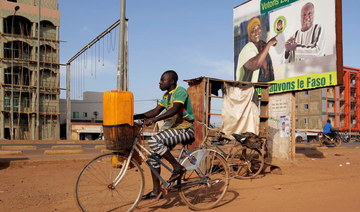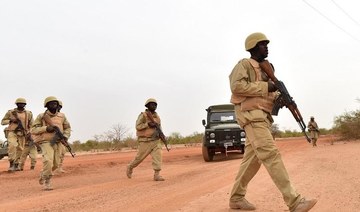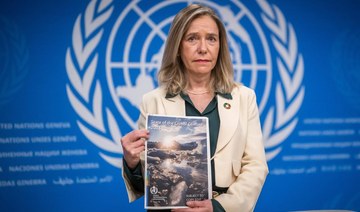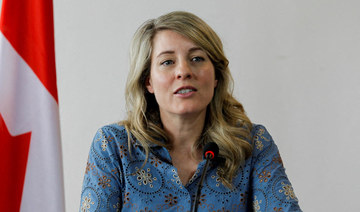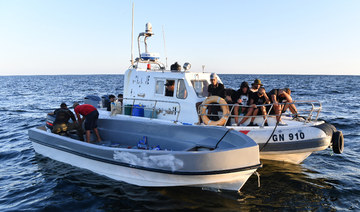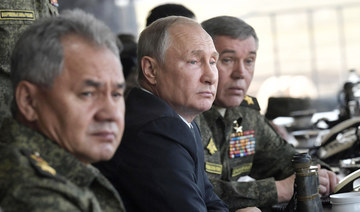OUAGADOUGOU: Burkina Faso’s former president Blaise Compaore will boycott a trial opening next week on the assassination of revolutionary leader Thomas Sankara, where he is the main accused, his lawyers said on Thursday.
“President Blaise Compaore will not be attending the political trial that is being staged against him at the military court of Ouagadougou, nor will we,” Compaore’s Burkinabe and French attorneys said.
In the trial opening on Monday, Compaore and 13 others face an array of charges in the 1987 death of Sankara, a charismatic Marxist-Leninist sometimes dubbed the African Che Guevara.
Sankara took power in the impoverished Sahel state in 1983, renaming the country the following year from the colonial-era Upper Volta to Burkina Faso, which means “land of the honest men.”
He carried out a string of radical policies, including nationalizations, public housing and a ban on female genital mutilation, polygamy and forced marriages.
But he was shot dead on October 15, 1987, aged just 37, during a putsch led by Compaore, a former friend.
Compaore was himself ousted in 2014 by a popular uprising after 27 years in power and fled to Ivory Coast, where he has obtained Ivorian nationality.
Many in Burkina Faso hope the trial will shed light on one of the bloodiest chapters in the country’s long history of volatility.
Compaore, 70, has always denied accusations that he ordered Sankara’s killing.
After his fall from power, an investigation into the assassination was opened in 2015 under a transitional government and a warrant for his arrest was issued the following year.
Those accused include Compaore’s former right-hand man — General Gilbert Diendere, a former head of the elite Presidential Security Regiment (RSP).
The pair face charges of complicity in murder, harming state security and complicity in the concealment of corpses.
Diendere, 61, is already serving a 20-year sentence in Burkina Faso for masterminding a plot in 2015 against the transitional government.
Another prominent figure among the accused is Hyacinthe Kafando, a former chief warrant officer in Compaore’s presidential guard, who is accused of leading the hit team. He is on the run.
Compaore’s lawyers, Pierre-Olivier Sur and Abdoul Ouedraogo, said the military tribunal was an “exceptional court” that lay outside common law.
They said their client had never received a summons to be questioned, nor had he received any formal accusation against him, except for the summons to attend the trial.
In addition, Compaore, has “immunity as a former head of state,” they claimed.
“Although president Blaise Compaore does not recognize the justice of President Roch Kabore (Burkina’s current president), he retains trust in international justice,” they added.
They noted a decision by the European Court of Human Rights to suspend the extradition from France of Compaore’s brother Francois, accused in the murder of a Burkinabe journalist in 1998.
The upcoming trial has been hailed by Sankara supporters and others who say that Burkina Faso has long suffered by failing to prosecute his assassins.
The Thomas Sankara International Memorial Committee (CIMTS) said the trial was “a victory” showing that “Burkina Faso, the land of honest men, is a state of law in which impunity is not a benchmark” of justice.
It said that Sankara’s widow Mariam, who has been living in the southern French town of Montpellier since 1990, was scheduled to attend the opening of the trial, “barring unexpected developments.”
Burkina ex-president to snub trial on Sankara assassination
https://arab.news/mpbgw
Burkina ex-president to snub trial on Sankara assassination
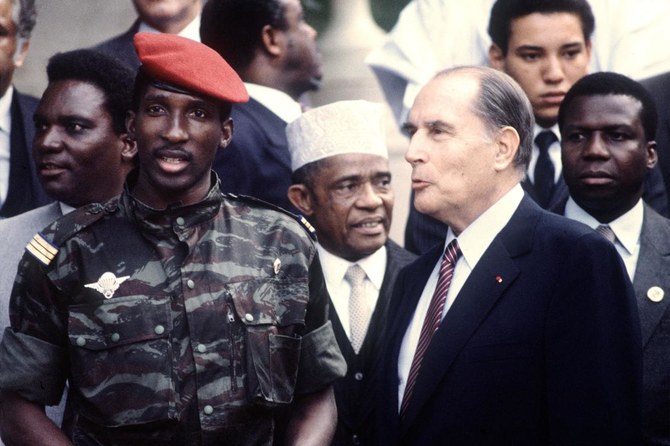
- Thomas Sankara took power in the impoverished Sahel state in 1983, renaming the country from the colonial-era Upper Volta to Burkina Faso, which means ‘land of the honest men’
- Sankara was shot dead on October 15, 1987, aged just 37, during a putsch led by Blaise Compaore, a former friend
NASA chief asks nations to work together on climate change
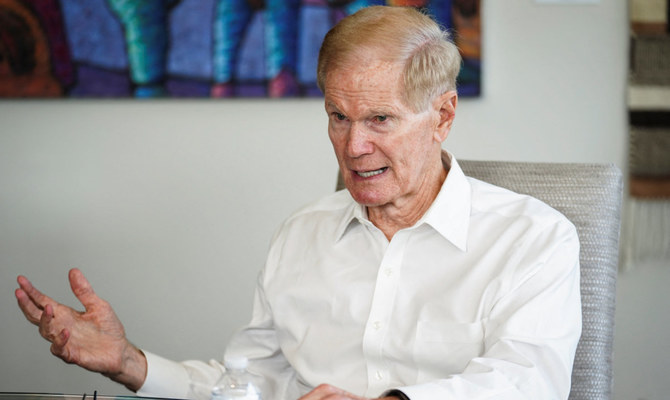
- Solutions to mitigate greenhouse gas emissions that rapidly warm the planet and drive the climate crisis already exist, but require unprecedented changes at a new scale and pace
MEXICO CITY: NASA is hoping that nations will work together more closely in the future on topics such as climate change, including greenhouse gas emissions, the space agency’s head, Bill Nelson, said on Tuesday.
Solutions to mitigate greenhouse gas emissions that rapidly warm the planet and drive the climate crisis already exist, but require unprecedented changes at a new scale and pace.
“This is something that nations can work on together because the information is there,” Nelson said in Mexico City when asked about how to address greenhouse gas emissions. “It’s important that we act on it.”
Satellites have emerged as powerful tools for scientists around the world to study climate change but also, increasingly, pinpoint the origin of greenhouse gas emissions, such as methane leaks, that would otherwise have gone undetected.
Nelson added that satellites were constantly collecting data about climate and NASA was looking to make this data accessible, and educate people on how to use it.
Methane, the main component of natural gas, is the second-largest contributor to global warming after carbon dioxide. Scientists can now pinpoint the origin of large methane leaks using data gathered by satellites.
It is a much more potent driver of global warming in the short term than carbon dioxide because it traps more heat in the atmosphere, ton for ton.
“The types of concerns that we have are global,” said NASA Deputy Administrator Pam Melroy. “It’s very important to recognize that not any one country can solve that problem alone.”
Earlier in the day, Nelson and Melroy, who are both astronauts, met with Mexican President Andres Manuel Lopez Obrador and lawmakers to discuss how the countries can work together.
Canadian police charge 2 former UN employees with conspiracy to sell military equipment in Libya

- Poirier said Mhaouek, a Canadian citizen, was arrested Tuesday morning at his home in the Montreal suburb of Ste-Catherine, Que., and was scheduled to appear in a Montreal court later in the day
MONTREAL: Two former United Nations employees in Montreal have been charged with participating in a conspiracy to sell Chinese-made drones and other military equipment in Libya, Canadian police said Tuesday.
RCMP spokesman Sgt. Charles Poirier said the alleged offenses occurred between 2018 and 2021, when the two men were working at the International Civil Aviation Organization, a UN agency headquartered in Montreal.
Police identified the two men as Fathi Ben Ahmed Mhaouek, 61, and Mahmud Mohamed Elsuwaye Sayeh, 37. Poirer said they violated UN sanctions related to the Libyan civil war. The sanctions have the force of law in Canada by way of federal regulation.
“What we found is that through some shell companies, they attempted to sell this Chinese military equipment to Libya, which is a direct violation of the regulation,” Poirier said, adding that the military equipment included large drones that can carry multiple missiles.
Poirier said the regulation prohibits anyone in Canada from supplying military equipment to any of the factions that were fighting in the Libyan civil war, or helping to finance those groups. The alleged conspiracy, he said, would have benefited one of the two main factions in the conflict, which ended in 2020.
“The second part of this scheme was to export Libyan oil to China,” Poirier said. “So at the time, the oil fields were under the control of Gen. Khalifa Haftar and the plan was to sell millions of drums of crude oil to China without anyone knowing about it.”
Haftar’s self-styled Libyan National Army fought against Libya’s UN-backed government and held much of the country’s east during the civil war; he continues to be a powerful figure in that region.
Poirier said Mhaouek, a Canadian citizen, was arrested Tuesday morning at his home in the Montreal suburb of Ste-Catherine, Que., and was scheduled to appear in a Montreal court later in the day.
Mhaouek’s alleged accomplice remains on the run. An Interpol red notice — an alert sent to police around the world — and a Canada-wide warrant have been issued for Sayeh’s arrest.
Poirier said investigators have no indication that military equipment or crude oil ever reached their alleged final destinations, but he said if they had, the two co-conspirators stood to gain several million dollars in commissions.
“The theory behind the motivation is primarily financial,” he said. However, it would have also benefited China by allowing it to covertly support Haftar’s faction and by giving the country prime access to Libyan oil.
Poirier said the investigation began in 2022 after the RCMP received what he described as “credible intelligence.”
Both men had diplomatic immunity due to their work with the UN Their immunity had to be waived by ICAO before the two men could be charged.
The UN organization, which sets international aviation standards, has been collaborating with the police investigation.
“There’s no indication that ICAO was aware of the conspiracy until they were approached by us,” Poirier said.
Police don’t know where Sayeh, a Libyan national, may be.
“He could be in Libya, but with the level of influence and the networking that these men had working at ICAO, he could be anywhere,” Poirier said.
The UN’s civil aviation agency said in an emailed statement that it is committed to upholding Canadian laws, UN standards and its own ethics code.
“ICAO is fully cooperating with the RCMP investigation of the individuals involved in the complaint, who left the organization a number of years ago,” the agency said. “ICAO strongly condemns any actions of individuals that are inconsistent with the organization’s values.”
Rights concerns, costs undermine Turkiye-EU migrant deal, say auditors
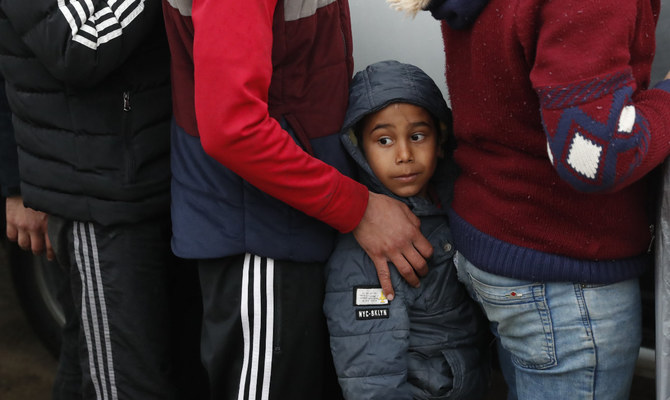
- EU Ombudsman Emily O’Reilly has launched an inquiry into human rights guarantees under the bloc’s new migration deal with Tunisia
BRUSSELS: Turkiye’s poor human rights record and economic factors are undermining the effectiveness of the European Union’s migration deal with Ankara, EU auditors said on Wednesday.
Under the 2016 deal, Ankara agreed to take back migrants who had crossed from its territory to Europe in return for EU aid to help fund more than four million refugees on Turkish soil.
The EU, which faces elections in June for the European Parliament in which illegal migration promises to be a big issue, has sealed agreements similar to the Turkiye scheme with Tunisia, Egypt, Mauritania and others.
In their report, the EU auditors raised concerns about the ability of non-governmental organizations (NGOs) to operate projects, as envisaged under the 6 billion euro ($6.4 billion) deal, given Turkiye’s authoritarian turn since a failed coup in 2016 and its crackdown on dissent.
“The operating situation of NGOs has continuously deteriorated since 2015 and has been exacerbated in the context of the unsuccessful... coup in Turkiye, where NGOs subsequently were targeted through various legislation,” it said.
The European Court of Auditors (ECA) report also cited the difficulty of managing the EU aid in the context of Turkiye’s economic downturn and Ankara’s “backsliding on the rule of law and fundamental rights.”
The report said the European Commission, the EU’s executive, had failed to provide an adequate analysis of costs and that it was unclear what would happen once the aid ended.
“The facility is beneficial for refugees and host communities but we would still like to see improvements in terms of demonstrating impact, ensuring sustainability, and value for money,” said Bettina Jakobsen, who led the ECA report.
Rights groups and some politicians have long accused the EU of neglecting human rights in its drive to curb illegal migration.
“This leads to the EU focusing less on issues that should be of relevance such as the neglect of human rights,” said Florian Trauner, a professor at the Brussels School of Governance.
EU Ombudsman Emily O’Reilly has launched an inquiry into human rights guarantees under the bloc’s new migration deal with Tunisia.
US, Russia set for a showdown at UN over nuclear weapons in space
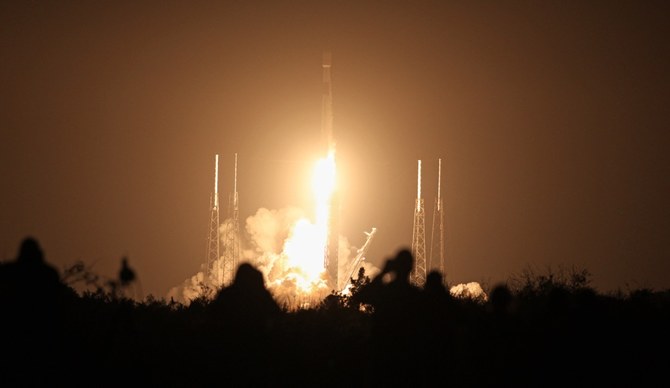
- The White House says Russia has not yet deployed such a weapon.
UNITED NATIONS/WASHINGTON: The United States and Russia are set to face off over nuclear weapons in space on Wednesday at the United Nations Security Council, which is due to vote on a US-drafted resolution calling on countries to prevent an arms race in outer space.
Russia is expected to block the draft resolution, said some diplomats. The US move comes after it accused Moscow of developing an anti-satellite nuclear weapon to put in space, an allegation that Russia’s defense minister has flatly denied.
US Ambassador to the UN Linda Thomas-Greenfield and Japan’s UN Ambassador Yamazaki Kazuyuki said in a joint statement on Friday that they have been negotiating with Security Council members on the draft text for six weeks.
The text affirms the obligation of states to comply with the Outer Space Treaty and calls on countries “to contribute actively to the objective of the peaceful use of outer space and of the prevention of an arms race in outer space.”
The 1967 Outer Space Treaty bars signatories – including Russia and the United States – from placing “in orbit around the Earth any objects carrying nuclear weapons or any other kinds of weapons of mass destruction.”
Russia and China are planning to first put an amendment to a vote in the council. The amendment echoes a 2008 proposal by the pair for a treaty banning “any weapons in outer space” and threats “or use of force against outer space objects.”
The amendment is not expected to be adopted, said diplomats. The amendment and the draft resolution each require at least nine votes in favor and no vetoes by Russia, China, the United States, Britain or France to be adopted.
“Without our amendment, based on the General Assembly resolution adopted in December 2023, the text tabled by the US will be unbalanced, harmful and politicized,” deputy Russian UN Ambassador Dmitry Polyanskiy told Reuters, adding that it would also undermine the Outer Space Treaty legal regime.
Polyanskiy said “all questions relating to this sphere should be considered by the full membership of States Parties to this Treaty and not by the UN Security Council members only.”
US intelligence officials, according to three people familiar with their findings, believe the Russian capability to be a space-based nuclear bomb whose electromagnetic radiation if detonated would disable vast networks of satellites.
White House National Security Council spokesman John Kirby has said Russia has not yet deployed such a weapon.
Russian President Vladimir Putin said in February that Russia was against the deployment of nuclear weapons in space.
Governments have increasingly viewed satellites in Earth’s orbit as crucial assets that enable an array of military capabilities on Earth, with space-based communications and satellite-connected drones in the war in Ukraine serving as recent examples of the outsized role of space in modern warfare.
Russia invaded neighboring Ukraine in February 2022.
Google fires at least 20 more workers who protested its $1.2bn contract with Israel
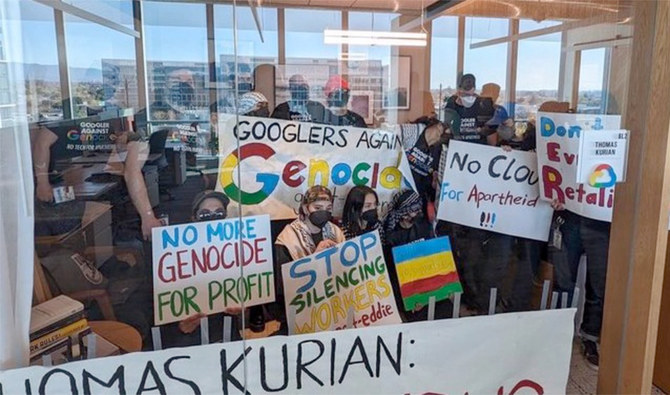
NEW YORK: Google fired at least 20 more workers in the aftermath of protests over technology the company is supplying the Israeli government amid the Gaza war, bringing the total number of terminated staff to more than 50, a group representing the workers said.
It’s the latest sign of internal turmoil at the tech giant centered on “Project Nimbus,” a $1.2 billion contract signed in 2021 for Google and Amazon to provide the Israeli government with cloud computing and artificial intelligence services.
Workers held sit-in protests last week at Google offices in New York and Sunnyvale, California. The company responded by calling the police, who made arrests.
The group organizing the protests, No Tech For Apartheid, said the company fired 30 workers last week — higher than the initial 28 they had announced.
Then, on Tuesday night, Google fired “over 20” more staffers, “including non-participating bystanders during last week’s protests,” said Jane Chung, a spokeswoman for No Tech For Apartheid, without providing a more specific number.
“Google’s aims are clear: the corporation is attempting to quash dissent, silence its workers, and reassert its power over them,” Chung said in a press release. “In its attempts to do so, Google has decided to unceremoniously, and without due process, upend the livelihoods of over 50 of its own workers.”
Google said it fired the additional workers after its investigation gathered details from coworkers who were “physically disrupted” and it identified employees who used masks and didn’t carry their staff badges to hide their identities. It didn’t specify how many were fired.
The company disputed the group’s claims, saying that it carefully confirmed that “every single one of those whose employment was terminated was personally and definitively involved in disruptive activity inside our buildings.”
The Mountain View, California, company had previously signaled that more people could be fired, with CEO Sundar Pichai indicati ng in a blog post that employees would be on a short leash as the company intensifies its efforts to improve its AI technology.



